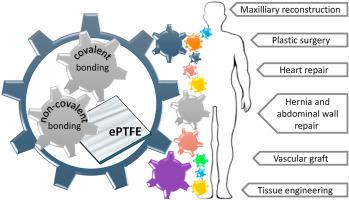Materials Today Chemistry ( IF 7.3 ) Pub Date : 2021-01-23 , DOI: 10.1016/j.mtchem.2020.100412 Y. Roina , F. Auber , D. Hocquet , G. Herlem

|
Polytetrafluoroethylene (PTFE) is a ubiquitous material used in implants and medical devices in general due to its high biocompatibility and inertness; blood vessels, heart, jawbone, nose, eyes, or abdominal wall can benefit from its properties in the case of disease or injury. Its expanded version, ePTFE, is an improved version of PTFE with better mechanical properties, which extend its medical applications. However, ePTFE implants often lack improvement in properties such as antibacterial, antistenosis, or tissue integration properties. Improvements in these properties by several strategies of functionalization for medical purposes are discussed in this review. Covalent and non-covalent bonding are reviewed, including more specifically chemical impregnation, chemical surface modification, autologous vascularization, and cell seeding, which are strategies mainly used for improving the properties of ePTFE and are described in this review.
中文翻译:

用于医疗应用的ePTFE功能化
聚四氟乙烯(PTFE)具有高生物相容性和惰性,因此通常用于植入物和医疗设备。在疾病或受伤的情况下,血管,心脏,颚骨,鼻子,眼睛或腹壁可受益于其特性。它的扩展版本ePTFE是具有更好机械性能的PTFE的改进版本,扩展了其医疗应用。但是,ePTFE植入物通常缺乏诸如抗菌,抗狭窄或组织整合等特性的改善。在这篇综述中讨论了通过几种用于医学目的的功能化策略对这些特性的改进。对共价键和非共价键进行了综述,包括化学浸渍,化学表面修饰,自体血管形成和细胞接种,



























 京公网安备 11010802027423号
京公网安备 11010802027423号